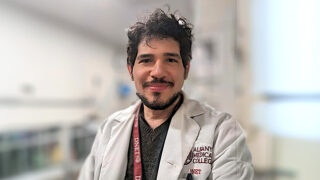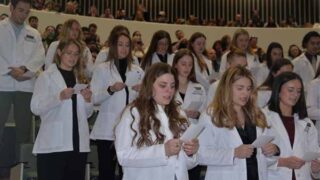Top-Level Pathology Training
Our program is an accredited four-year combined residency in anatomic and clinical pathology and three-year anatomic pathology only track. We provide broad, diverse training in all aspects of anatomic and clinical pathology.
The training in anatomic pathology includes surgical pathology, autopsy, forensic pathology, cytopathology, dermatopathology, neuropathology, hematopathology, molecular diagnostics, renal pathology, electron microscopy and immunopathology. The program in clinical pathology provides training in medical microbiology, hematology, immunohematology, transfusion medicine, clinical chemistry, clinical immunology, toxicology, flow cytometry, cytogenetics, laboratory management and informatics. Our research program emphasizes cancer molecular biology.
Residents rotate in two- or four-week blocks in both anatomic and clinical pathology throughout the four years. The training is comprehensive and occurs in a supportive environment with a faculty dedicated to resident education. The residents are based primarily at Albany Medical Center’s main campus, but also rotate at the Stratton VA Medical Center conveniently located across the street from Albany Medical Center.
Albany Medical Center, part of the Albany Med Health System, is the only academic tertiary care center in a region with a catchment area of 25 counties, ensuring a diverse patient population and a wide variety of cases. Visit the Department of Pathology and Laboratory Medicine for more information.
Student Teaching
The Department of Pathology and Laboratory Medicine plays an active and vital role in the medical student teaching curriculum by providing a subspecialty didactic lecture series, gross tutorials, case-based small group sessions, and an immersive pathology elective. Our residents function as the lead instructors during the second year small group gross autopsy sessions and case-based tutorials. They actively engage 10-15 medical students per session via an interactive hands-on approach for gross pathology and through the chat function during the microscopic cases.
Following each session, the resident is available for informal questions and answers and then manages a more formal review after administering an online post session formative assessment. In addition, fourth year medical students who do a pathology elective are assigned to a resident so they can experience all of the many daily activities our residents encounter. This includes didactic lectures, multi-headed microscopic sign-out, gross dissection, autopsy, and intra- and interdisciplinary conferences. Medical students have the opportunity to collaborate with residents and faculty on research projects. Through this structure, the senior residents are able to develop mentoring skills under the supervision of our attending staff.


